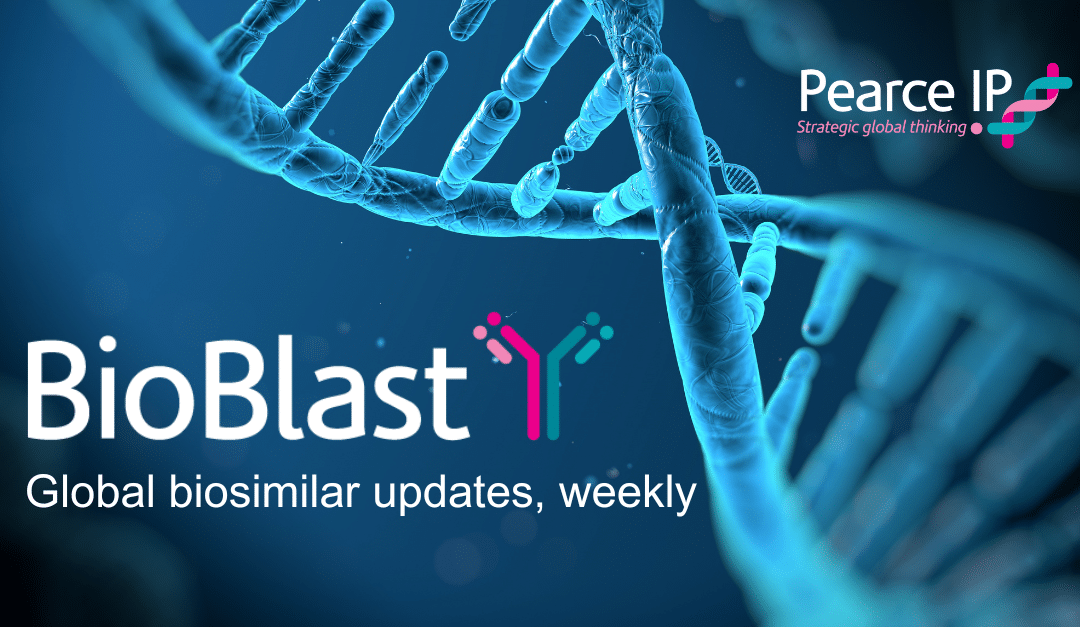On 15 September 2023, Novartis shareholders approved the proposed Sandoz spin-off, Novartis’ generics and biosimilars business at its Extraordinary General Meeting. The proposed spin-off was first announced by Novartis on 25 August 2022, a proposal which was unanimously endorsed by the Novartis board on 18 July 2023 with a target date of Q4/23.
The EMA’s Committee for Medicinal Products for Human Use (CHMP) adopted a positive opinion for Sandoz’s Herwenda® (trastuzumab, biosimilar to Genentech’s Herceptin®), to treat metastatic and early breast cancer and metastatic gastric cancer.
On the same day, Novartis’s shareholders approved the Sandoz spin-off which is scheduled for 4 October 2023.
On 15 September 2023, EMA’s Committee for Medicinal Products for Human Use (CHMP) recommended Sandoz’s Herwenda® (trastuzumab, biosimilar to Genentech’s Herceptin®) for approval for the treatment of metastatic and early breast cancer and metastatic gastric cancer.
CHMP also recommended an extension of indication for AstraZeneca/Daiichi Sankyo’s Enhertu® (trastuzumab deruxtecan) as monotherapy for the treatment of patients with advanced non-small cell lung cancer (NSCLC) whose tumours have an activating HER2 (ERBB2) mutation and who require systemic therapy following platinum-based chemotherapy with or without immunotherapy.
CHMP also adopted a positive opinion for three new biologics:
-
Eli Lily’s Ebglyss® (lebrikizumab) to treat moderate and severe forms of atopic dermatitis in adults and adolescents;
-
Novartis’ Finlee® (dabrafenib) to treat glioma; and
-
Daiichi Sankyo’s Vanflyta® (quizartinib) to treat patients with diagnosed acute myeloid leukaemia (ACL).
The CHMP recommended indication extensions for the following biologics:
-
Seagen’s Adcetris® (brentuximab vedotin) to treat patients with previously untreated CD30+ Stage III or IV Hodgkin lymphoma;
-
Vertex’s Kaftrio® (ivacaftor/tezacaftor/elexacaftor) two new presentations of (60mg/40mg/80mg and 75mg/50mg/100mg granules in sachet) for use in children aged 2 to 5 years of age;
-
Vertex’s Kalydeco® (ivacaftor) to include treatment of cystic fibrosis in children aged between 2 and 6 years in a combination regimen with ivacaftor/tezacaftor/elexacaftor;
-
Merck’s Keytruda® (pembrolizumab) as monotherapy is indicated for the adjuvant treatment of adults with non-small cell lung carcinoma who are at high risk of recurrence following complete resection and platinum‑based chemotherapy;
-
Eli Lilly’s Olumiant® (baricitinib) to treat moderate to severe atopic dermatitis in paediatric patients 2 years and older who are candidates for systemic therapy; and
-
Takeda’s Takhzyro® (lanadelumab) to prevent recurrent attacks of hereditary angioedema in patients aged 2 years and older.
According to the Pharmaceutical Benefits Assessment Committee (PBAC) November 2023 agenda published last week, the meeting will be jammed with biopharma applications for reimbursement. PBAC will consider the following applications for PBS listing additions or amendments at its November 2023 meeting:
| New listing applications: | Amendment Applications |
| 1. Organon’s Hadlima® (adalimumab) biosimilar to AbbVie’s Humira® | 1. Sanofi-Aventis’ Libtayo® (cemiplimab) |
| 2. GSK’s Jemperli® (dostarlimab) | 2. BMS’s Opdivo® (nivolumab) |
| 3. Vertex’s Kalydeco® (ivacaftor) | 3. Merck’s Keytruda® (pembrolizumab) |
| 4. GSK’s Menveo® (meningococcal vaccine) | 4. AbbVie’s Skyrizi® (risankizumab) |
| 5. Pfizer’s Prevenar 20® (pneumococcal conjugate vaccine) | 5. Novartis’ Cosentyx® (secukinumab) |
| 6. Generic Health’s Teriparatide Lupin® (teriparatide) biosimilar to Eli Lily’s Forteo® | |
| 7. Gedeon Richter’s Terrosa® (teriparatide) biosimilar to Eli Lily’s Forteo® | |
| 8. Beigene’s Tevimbra® (tiselizumab) | |
| 9. AstraZeneca’s Enhertu® (trastuzumab deruxtecan) biosimilar to Genentech’s Herceptin® |
In addition, a number of PBAC recommendations not accepted by applicants are set for review, including relating to Alphapharm’s Hulio® (adalimumab, biosimilar to AbbVie’s Humira®), Pfizer’s Zirabev® (bevacizumab, biosimilar to Genentech’s Avastin®) and Alphapharm’s Rymti® (etanercept) biosimilar to Amgen’s Enbrel®.
On 1 March 2023, the November 2022 PBAC outcomes were announced, with three biologics listed, including Sanofi-Aventis’ dupilumab (Dupixent®) autoinjectors in two new forms, Merck’s pembrolizumab (Keytruda®) and AbbVie’s risankizumab (Skyrizi®).
Takeda announced that the FDA accepted its Biologics License Application (BLA) for its subcutaneous formulation of vedolizumab (Entyvio®) for maintenance therapy in patients with moderate to severe active Crohn’s disease after induction therapy with IV Entyvio®. Currently Takeda’s Entyvio® is formulated and approved in the US for IV use only.
On 30 March 2023, Takeda published a study demonstrating that Entyvio® was more effective than a placebo inducing remission of chronic pouchitis after undergoing ileal pouch–anal anastomosis (IPAA) for ulcerative colitis. Shortly prior on 27 March 2023 Takeda secured approval in Japan for Entyvio® SC as maintenance therapy for moderate to severe ulcerative colitis in patients with inadequate response to conventional treatment.
Sandoz and Samsung Bioepis announced they have entered an exclusive agreement to develop and commercialise SB17 (ustekinumab, biosimilar to Janssen’s Stelara®) in the US, Canada, EEA, Switzerland and the UK. Others details of the deal are confidential.
This follows a confidential settlement in August 2023 between Samsung Bioepis and Janssen which resolved all pending disputes between the parties. In that same month, Samsung Bioepis and Janssen filed a joint motion to terminate Samsung Bioepis’ IPR against Janssen’s US patent 10,961,307 filed 2 months earlier.
Pfizer and BioNTech announced that the FDA approved their sBLA for their 2023-2024 COVID-19 vaccine for patients over 12 years of age, and granted emergency use authorisation for patients from 6 months to 11 years old. The vaccine is an omicron XBB.1.5-adapted monovalent vaccine indicated as a single dose for most patients over 5.
On 26 May 2023, Alnylam sued both Moderna and Pfizer for a third time claiming patent infringement regarding COVID-19 vaccines.

Naomi Pearce
CEO, Executive Lawyer (AU, NZ), Patent Attorney (AU, NZ) & Trade Mark Attorney (AU)
Naomi is the founder of Pearce IP, and is one of Australia’s leading IP practitioners. Naomi is a market leading, strategic, commercially astute, patent lawyer, patent attorney and trade mark attorney, with over 25 years’ experience, and a background in molecular biology/biochemistry. Ranked in virtually every notable legal directory, highly regarded by peers and clients, with a background in molecular biology, Naomi is renown for her successful and elegant IP/legal strategies.
Among other awards, Naomi is ranked in Chambers, IAM Patent 1000, IAM Strategy 300, is a MIP “Patent Star”, and is recognised as a WIPR Leader for patents and trade marks. Naomi is the 2023 Lawyers Weekly “IP Partner of the Year”, the 2022 Lexology client choice award recipient for Life Sciences, the 2022 Asia Pacific Women in Business Law “Patent Lawyer of the Year” and the 2021 Lawyers Weekly Women in Law SME “Partner of the Year”. Naomi is the founder of Pearce IP, which commenced in 2017 and won 2021 “IP Team of the Year” at the Australian Law Awards.

Sian Hope
Lawyer
Sian is a life sciences focussed intellectual property lawyer with a particular focus on the pharmaceutical, biotechnology and healthcare industries. Her practice is primarily in patent litigation, but includes non-contentious patent matters, trade mark matters, health regulatory legal matters and consumer law.

